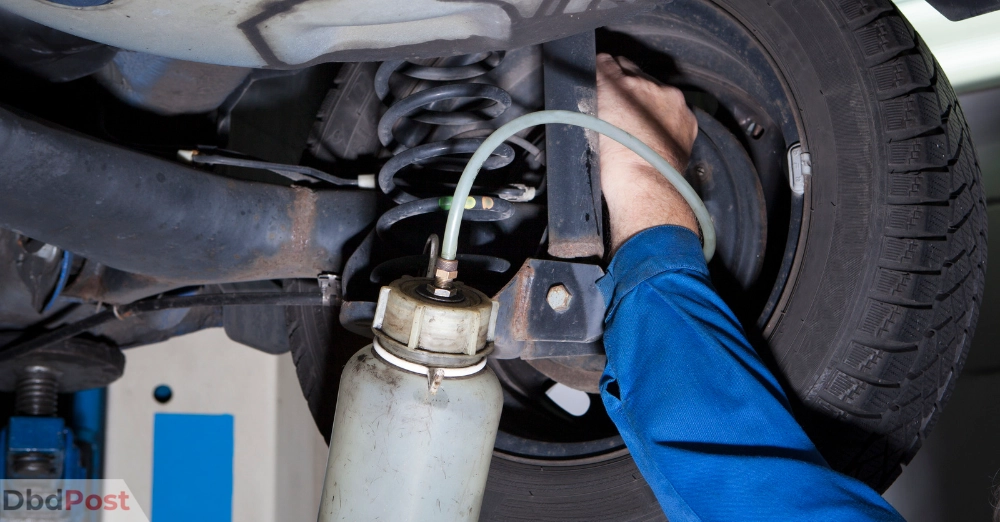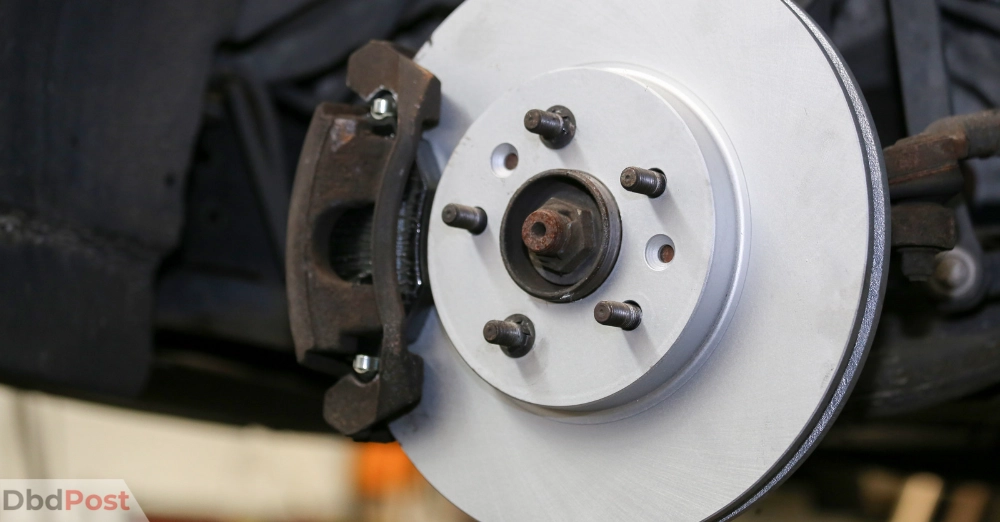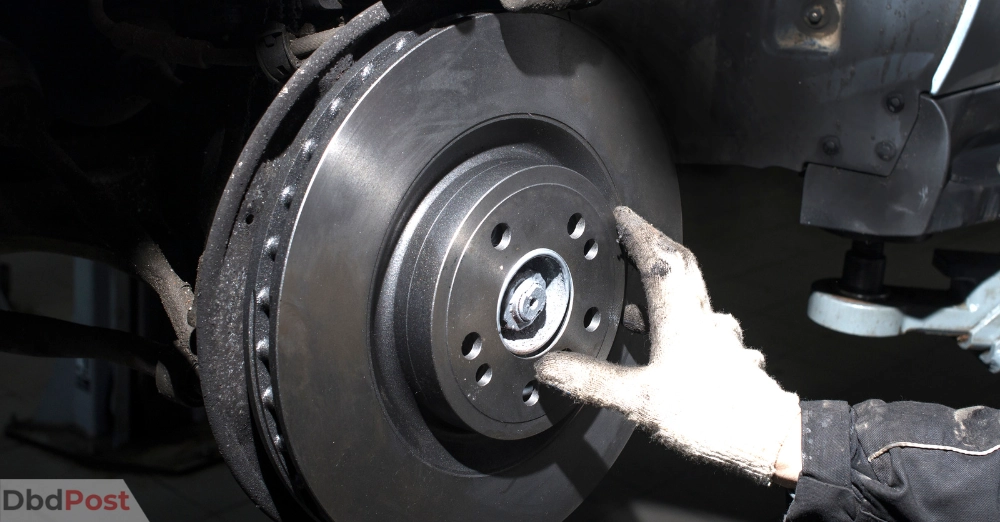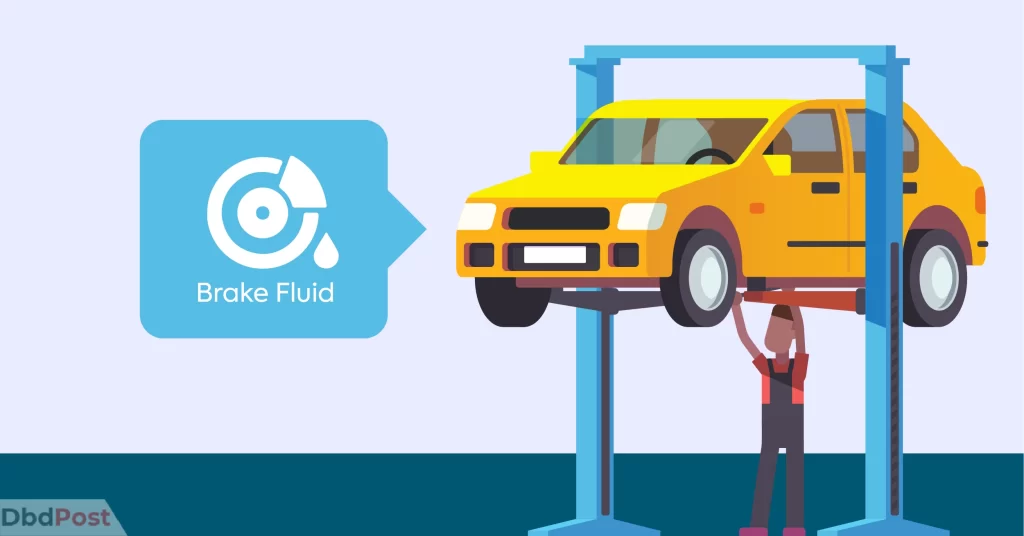The brake fluid change is important for maintaining a vehicle’s braking system. Several factors, such as the location and type of vehicle, influence the Brake fluid change cost.
It can cost around $100 to change the brake fluid. It should be changed every two years. Some common signs indicate the time to change the brake fluid, such as spongy brake pedal, brake warning lights, and more.
In this Dbd guide, we have included all the information on when to change the brake fluid and factors affecting the price of brake fluid change. We consulted with manufacturers and factory-trained mechanics to create this guide.
What is the cost of brake fluid change?

Maintaining your vehicle’s brake fluid is crucial for safety and effectiveness. The cost of a brake fluid change varies depending on several factors like location, vehicle type, and the mechanic’s hourly rate.
An average brake fluid change costs around $100, including labor, parts, shop supplies, and disposal fees.
The cost of brake fluid alone can range from $10 to $20 a quart, depending on the quality of the fluid used. The mechanic’s location and hourly rate also affect the total cost. Labor costs can range from $50 to $100 per hour.
Variables such as vehicle type and brake system complexity can also affect the overall cost.
It is important to obtain a detailed estimate from a qualified mechanic before scheduling a brake fluid change. This will help to ensure safe and efficient maintenance of the vehicle’s braking system.
Ultimately, the cost of a brake fluid change is a worthwhile investment in maintaining the vehicle’s safety and longevity.
When should you change brake fluid?

To maintain the safety and reliability of a braking system, regular brake fluid change is required.
The recommended change interval for most vehicles is every two years. However, this may vary depending on the type of vehicle and driving conditions.
Likewise, this can vary depending on the type of vehicle and driving conditions. For example, vehicles driven in hot climates, mountainous terrain, or heavy stop-and-go traffic require more frequent brake fluid changes.
Regular brake fluid maintenance is crucial for the proper functioning and safety of your vehicle’s brakes. Brake fluid absorbs moisture from the air, which can lead to corrosion, decreased effectiveness, and a lower boiling point.
If you neglect to maintain your brake fluid, it can result in brake fade, fluid leaks, and even brake failure. This results in expensive repairs and causes accidents too.
Therefore, it is crucial to schedule regular brake fluid flushes and replacements. It prevents potential hazards and ensures the long-term health of your vehicle.
Signs that indicate brake fluid needs to be changed

Maintaining the brake system is essential for the safety of any vehicle. Some common signs indicate the time to change the brake fluid.
Here are some of the most common signs that indicate it’s time to change brake fluid:
Spongy brake pedal
Soft brake pedals or brake pads are common signs that the brake fluid needs to be changed. This happens when the brake fluid has absorbed too much moisture, which affects the hydraulic pressure of the braking system.
Low brake fluid levels
If the brake fluid level is low, it could indicate it’s time to change the fluid. Low levels could indicate a leak in the system, which needs to be addressed immediately.
Brake warning light
The brake warning light on the dashboard is a clear indication that something is wrong with the brake system. In most cases, the brake fluid level is low, and it’s time to change the fluid. [1]Volkswagen, “Brake Warning Light, … Continue reading
Contaminated brake fluid
If the brake fluid appears dirty or contaminated, it’s time to change the old brake fluid. Dirty brake fluid can cause corrosion and damage to the brake system components, resulting in expensive repairs.
It’s crucial to pay attention to these signs and change the brake fluid when necessary to ensure vehicle safety and its occupants. Regular brake fluid changes can also prolong the life of the brake system and prevent costly repairs.
Factors that may affect the cost of brake fluid change
When maintaining a vehicle, changing the brake fluid is an essential task. Yet, the cost of this service can vary depending on several factors.
Here, we will explore various factors that can affect the cost of changing brake fluid:
Type of Brake fluid
The type of brake fluid used can have a significant impact on brake fluid flush cost. There are two primary types of brake fluid:
- DOT 3: A glycol-based brake fluid commonly used in most cars
- DOT 4: Similar to DOT 3 but has a higher boiling point and is used in high-performance vehicles
- DOT 5: A silicone-based brake fluid that is not compatible with most brake systems
- DOT 5.1: Similar to DOT 4 but has a higher boiling point and is used in high-performance vehicles
DOT 4 is a more advanced brake fluid with superior performance and is often more expensive than DOT 3. However, it’s essential to use the type of brake fluid the manufacturer recommends.
Make and Model of the Vehicle
The make and model of the vehicle can also affect the cost of a brake fluid change. Some vehicles require more time and effort to place the new brake fluid due to the design of their brake system.
Luxury cars or sports cars may have complex brake systems that require special tools and expertise. It makes the brake fluid change more expensive.
Location
The location of the service center can also impact the brake fluid change cost. The cost may be higher in urban areas due to the higher overhead costs of running a business in a metropolitan area. In contrast, service centers located in rural areas may charge less for the same service.
Mechanic’s experience and reputation
The experience and reputation of the mechanic performing the brake fluid change can also affect the cost. A highly experienced and reputable mechanic may charge more than a less experienced mechanic.
However, choosing a qualified mechanic can ensure that the brake fluid change is done correctly. It also reduces the risk of brake failure.
In conclusion, several factors can affect the cost of a brake fluid change, including the type of brake fluid to the location of the service center. It is important to research and compare prices to ensure that you receive the best car repair service for your budget.
Related Stories
- Find out everything about Honda Tune Up Cost with our guide.
- Check this guide to know everything about Nissan Tune Up Cost.
- Check this guide on Hyundai Check Engine Light – here.
- Find out everything about Jeep Tune Up cost with our guide.
- Need to replace your Tesla battery? Find out everything about Tesla Battery Replacement cost with our guide.
FAQs
Can I change brake fluid myself, or do I need to take my car to a mechanic?
Yes, you can change brake fluid yourself. However, it is recommended to have a professional mechanic perform the task.
Is it necessary to change brake fluid if my brakes are working fine?
Yes, it is necessary to change the brake fluid regularly, even if your brakes are working fine. Brake fluid is hygroscopic, which absorbs moisture over time and can cause corrosion and brake failure.
What happens if brake fluid is never changed?
If the brake fluid is never changed, it can become contaminated with moisture and debris. Being contaminated leads to corrosion in the brake system and potentially causes brake failure.
Will changing brake fluid improve braking?
Yes, changing brake fluid can improve braking. It prevents the brake fade and corrosion in the brake lines.
In conclusion, the brake fluid change cost is important for proper vehicle maintenance at an effective price. We hope our guide provides all the information you need about the brake fluid replacement cost.
- 107shares
- Facebook Messenger
About the author
DbdPost Staff is a team of writers and editors working hard to ensure that all information on our site is as accurate, comprehensive, and trustworthy as possible.
Our goal is always to create the most comprehensive resource directly from experts for our readers on any topic.




